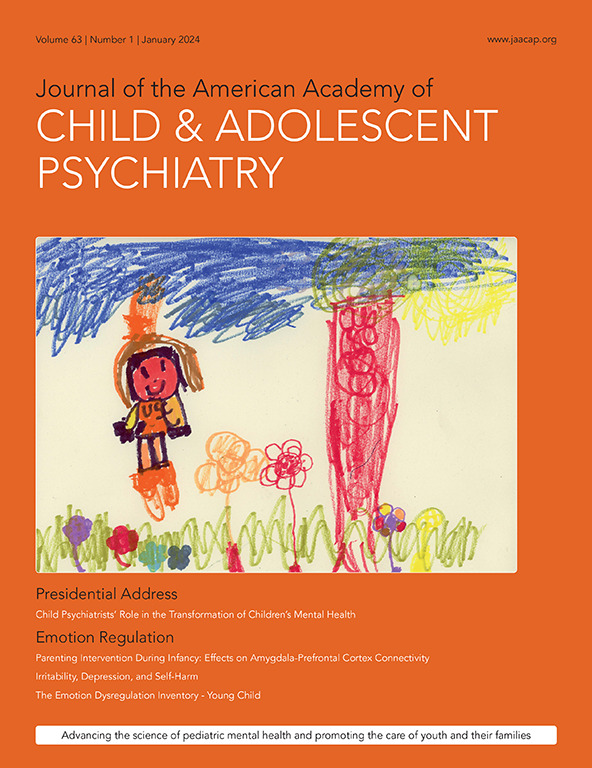母亲迁移、产前压力与儿童自闭症特征:一项基于人口的队列研究的启示。
IF 9.2
1区 医学
Q1 PEDIATRICS
Journal of the American Academy of Child and Adolescent Psychiatry
Pub Date : 2025-01-01
DOI:10.1016/j.jaac.2024.04.004
引用次数: 0
摘要
本文章由计算机程序翻译,如有差异,请以英文原文为准。
Maternal Migration, Prenatal Stress and Child Autistic Traits: Insights From a Population-Based Cohort Study
Objective
There is emerging evidence for an increased prevalence of autism in children of mothers with a migration background. To date, the mechanisms underlying this relationship are poorly understood. We investigated whether prenatal stress exposure mediates the association between maternal migration and child autistic traits, assessing first- and second-generation migrant mothers in the Netherlands and their children.
Method
The study was embedded in the prospective population-based Generation R cohort. Of the 4,727 participants, 1,773 mothers (38%) had a migration background. Prenatal stress was assessed using questionnaires related to stressful life events, family functioning, self-esteem, long-lasting difficulties, symptoms of psychopathology, social support, and perceived discrimination. Autistic traits were measured at age 6 years with the parent-reported Social Responsiveness Scale exclusively. Longitudinal multiple mediation analyses were performed. Analyses were stratified by migration origin (Europe and outside Europe) because of differences in migration characteristics.
Results
Maternal migration background was associated with more experienced stress and with higher child autistic trait scores (Europe: mean = 0.42, SD = 0.25; outside Europe: mean = 0.50, SD = 0.24) compared to no migration background (Netherlands: mean = 0.38, SD = 0.23; both p < .01). Prenatal stress, especially perceived discrimination and maternal psychopathology, accounted for up to half of the total effect of maternal migration, which remained after adjusting for sociodemographic factors (Bindirect = 0.035, 95% CI = 0.027, 0.043, Btotal = 0.074).
Conclusion
Stress during pregnancy mediated the association between maternal migration status and child autistic traits. Future research should focus on early interventions to assess whether reducing prenatal stress exposure among women with a migration background can result in lower offspring autistic traits.
Plain language summary
There is emerging evidence that autism is more common in children of mothers with a migration background, but it remains unclear why. This large, community-based longitudinal study followed 4,727 pregnant women, of whom 1,773 had a migration background, in the Netherlands. The authors found that mothers with a migration background reported more stress during pregnancy and more autistic traits in their children 6 years later than mothers without a migration background. Stress during pregnancy, especially perceived discrimination and maternal psychopathology, accounted for up to half of the total effect of maternal migration on child autistic traits.
Diversity & Inclusion Statement
We worked to ensure that the study questionnaires were prepared in an inclusive way. We worked to ensure sex and gender balance in the recruitment of human participants. We worked to ensure race, ethnic, and/or other types of diversity in the recruitment of human participants. We actively worked to promote sex and gender balance in our author group. The author list of this paper includes contributors from the location and/or community where the research was conducted who participated in the data collection, design, analysis, and/or interpretation of the work.
求助全文
通过发布文献求助,成功后即可免费获取论文全文。
去求助
来源期刊
CiteScore
21.00
自引率
1.50%
发文量
1383
审稿时长
53 days
期刊介绍:
The Journal of the American Academy of Child & Adolescent Psychiatry (JAACAP) is dedicated to advancing the field of child and adolescent psychiatry through the publication of original research and papers of theoretical, scientific, and clinical significance. Our primary focus is on the mental health of children, adolescents, and families.
We welcome unpublished manuscripts that explore various perspectives, ranging from genetic, epidemiological, neurobiological, and psychopathological research, to cognitive, behavioral, psychodynamic, and other psychotherapeutic investigations. We also encourage submissions that delve into parent-child, interpersonal, and family research, as well as clinical and empirical studies conducted in inpatient, outpatient, consultation-liaison, and school-based settings.
In addition to publishing research, we aim to promote the well-being of children and families by featuring scholarly papers on topics such as health policy, legislation, advocacy, culture, society, and service provision in relation to mental health.
At JAACAP, we strive to foster collaboration and dialogue among researchers, clinicians, and policy-makers in order to enhance our understanding and approach to child and adolescent mental health.

 求助内容:
求助内容: 应助结果提醒方式:
应助结果提醒方式:


